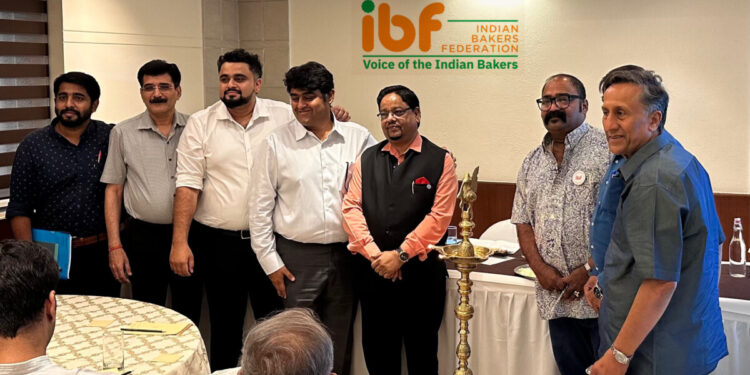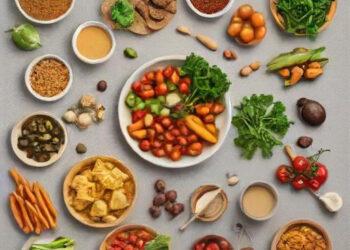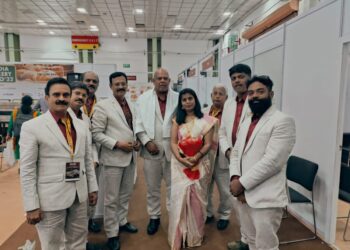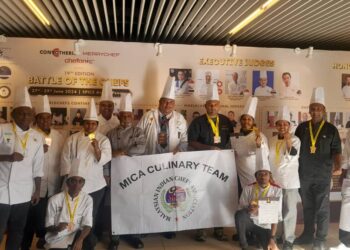BEST WISHES TO THE NEW CHAPTER FROM
 ————————————————————————————————————————-
————————————————————————————————————————-
By Tanisha Saxena (cbedit@imaws.org)
The Indian Bakers Federation (IBF) has long served as a vital liaison between bakers in India and the government. It represents the interests of the baking community by addressing regulatory challenges, market access, quality standards, and technological advancements. By facilitating communication and collaboration, the IBF supports the growth and development of the baking industry through events, workshops, and advocacy efforts.
On May 18th, the IBF launched its Delhi NCR Chapter, marking a significant step towards fostering business growth. Following the launch of the Delhi NCR Chapter, IBF plans to establish additional chapters in the near future. The inaugural ceremony was graced by Chief Guest, Dr. R.K. Bharati, Joint Director & Head of Office, Ministry of MSME, Government of India.

The event began with a welcome note by Mr. Balraj K. R. , the National Convener of IBF followed by a lamp-lighting ceremony led by Dr. R.K. Bharati. He was joined by Mr. Praveen Khanna, a prominent figure in the bakery industry, and Mr. Gaurav Dhingra, National Vice President, IBF. A silent prayer followed the lamp-lighting, marking the formal introduction of the Delhi NCR Chapter.
Mr. Balraj emphasized how the younger generation in the baking industry is revolutionizing the segment with innovative ideas and out-of-the-box marketing strategies. He noted, “The history of bakeries in Kerala has been influenced by Portuguese, Dutch, and British colonialists, resulting in a unique fusion of European techniques with local ingredients. While turnover isn’t as high as in North India, Kerala’s bakeries are renowned for their exceptionally high skill levels. There is a sense of unity among the city’s bakers. Such an association would provide a platform for bakers, pastry chefs, and other industry professionals to come together, share knowledge and expertise, and collectively address industry challenges. This association aims to foster networking, collaboration, and advocacy to elevate India’s baking industry as a whole. Moreover, networking will help us understand our strengths and weaknesses. Kerala lacks the income generation seen in the North, but excels in skill. Therefore, expertise from the South can be shared with the North, and vice versa.”
Goal setting for the Delhi NCR Chapter
Paul Mathew, IBF Delhi Chapter convenor, said, “The Delhi NCR Chapter has set ambitious goals for the year 2024-2025, focusing on growth, skill development, and industry engagement. One of the primary objectives is to achieve a membership base of 100 members within the first three months post-inauguration, targeting manufacturers, independent store owners, and bakery product resellers, and offering direct memberships to simplify the joining process.”
Furthermore, Mr. Gaurav Dhingra shared another goal, “In terms of skill development, the chapter plans to launch the IBF Apprenticeship Program to attract the right talent with appropriate skillsets. Additionally, they will partner with ‘Skill India’ to develop a specialized skilling program for the bakery and confectionery sector, aiming to cultivate better talent and enhance the industry’s capacity. In addition, the chapter aims to proactively engage with government officials to build strong relationships and advocate for the bakery industry. This will involve consistent outreach and collaboration with government bodies to ensure the industry’s needs and interests are well-represented.”
Dr. R K Bharati on MSME Support Schemes
Dr. Bharati began by recounting the humble beginnings of the MSME sector, dating back to the 1980s. He emphasized the challenge posed by India’s rich cultural and linguistic diversity, which made it difficult to address businesses through a single setup. He added, “Currently, there are 32 offices and 29 branch offices dedicated to the development of existing businesses and supporting new startups. Our primary focus is on empowering unemployed youth.”
Dr. Bharati highlighted the significant challenges faced in the early days when there was no internet or advanced technology. People would physically visit offices with their queries and grievances, often having to go from one office to another for even the simplest tasks, such as registering their factory with the MSME. However, today, everything is just a click away. The MSME portal is always active, allowing businesses to address their queries and needs by simply selecting the appropriate icon. This digital transformation has streamlined processes, making it more convenient and efficient for entrepreneurs to access essential services.
Dr. Bharati emphasized the importance of unity in overcoming challenges within the MSME sector. He introduced two key schemes aimed at enhancing competitiveness. The first is the Lean scheme, designed to increase competitiveness by forming four heterogeneous clusters. The implementation cost is covered 90% by the government, leaving only 10% as the responsibility of the participating businesses.
“The second scheme is the ZED (Zero Defect Zero Effect) Certification, part of the MSME Sustainable initiative. This extensive drive aims to raise awareness among MSMEs about ZED practices and incentivize them to achieve ZED Certification, ultimately encouraging them to become MSME Champions. The ZED Certification process helps MSMEs reduce wastage, increase productivity, enhance environmental consciousness, save energy, and optimally use natural resources, thereby expanding their markets,” he said.
Additionally, MSMEs are encouraged to adopt best practices in work culture, standardization of products, processes, and systems to enhance their global competitiveness and sustainability. The ZED Certification not only assesses and certifies MSMEs but also provides handholding, managerial, and technological interventions to ensure comprehensive improvement.
Dr. Bharati also explained, “The Government of India’s Ministry of Micro, Small and Medium Enterprises (MSME) provides support for businesses participating in events like the Aahar Expo and other approved exhibitions. Through the PMS portal, participants can check eligible activities and events to receive subsidies. For example, a food association in Rohini recently participated in Aahar and received reimbursement through this scheme. The approval process is straightforward, requiring only five to six documents. Note that there is now a cap of 60 participants per event to prevent misuse, whereas it was previously open to more participants.”
He stressed, “Additionally, there are reimbursement schemes for Intellectual Property Rights (IPR) and barcodes. All information regarding these schemes can be accessed without visiting the office. Simply download the ‘My MSME’ app or visit the DCMSME website for details. The entire PMS process is now online, allowing you to upload invoices and required documents directly on the website to receive your subsidy.”
The floor was then opened for a Q&A session, during which some young entrepreneurs asked Dr. Bharati how they could learn about all the schemes and other relevant information, as they were new to this. Dr. Bharati graciously responded that every detail is just a click away on the MSME website and app. Mr. Paul Mathews, the IBF Delhi NCR Chapter convenor, delivered the vote of thanks.
BEST WISHES FROM









